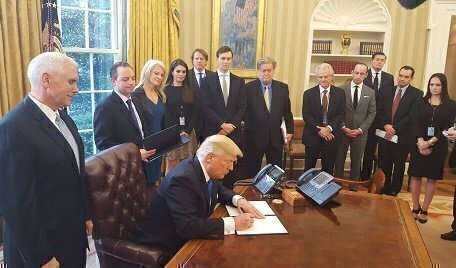The Trump Administration will return to the Supreme Court in an attempt to get free of a federal judge’s new order expanding entry to the U.S. of foreign nationals and refugees, Attorney General Jeff Sessions announced Friday afternoon.
 “The Supreme Court has had to correct this lower court once, and we will now reluctantly return directly to the Supreme Court to again vindicate the rule of law and the Executive Branch’s duty to protect the nation,” Sessions said in a public statement.
“The Supreme Court has had to correct this lower court once, and we will now reluctantly return directly to the Supreme Court to again vindicate the rule of law and the Executive Branch’s duty to protect the nation,” Sessions said in a public statement.
The attorney general did not specify what form its plea to the Justices will take, but presumably it will include a request to put on hold the new decision by U.S. District Judge Derrick K. Watson of Honolulu, while the Justice Department pursues an appeal seeking to overturn the judge’s relaxation of restrictions on entry of foreign nationals from six Mideast nations with Muslim majority populations, and entry of refugees from any nation.
The Justices are in their summer recess now, but they have staff on duty at the court, and can be reached for action on emergency matters that arrive in the meantime. If they are abroad, they can communicate with their law clerks. They would be expected to act quickly on any request to postpone Judge Watson’s order (discussed in a previous post).
A delay request (technically, a plea for a “stay”) would go first to Justice Anthony M. Kennedy, who is the Circuit Justice for handling emergency filings from the geographic area of the Ninth Circuit, which includes Hawaii. Judge Watson, whose court is in Honolulu, is one of two federal judges who earlier had blocked enforcement of key parts of the Trump executive order that was issued on March 6.
Justice Kennedy has the authority to act on his own on a postponement request, but these days it is more common for a single Justice, when considering a major controversy, to share the action with the eight other members of the court. The option to do so lies with the individual Justice.
In announcing that the government will move next to the Supreme Court, bypassing the normal path of going first to the U.S. Court of Appeals for the Ninth Circuit, the attorney general was seeking to emphasize the importance of the continuing controversy, but also perhaps to indicate a lack of optimism that the Ninth Circuit Court would be sympathetic to overturning Judge Watson’s order. It upheld most of what he had ordered in his first action on the controversy in late March.
It was that earlier Watson order against enforcing most of the provisions of the Trump immigration restrictions that the Supreme Court revised on June 26, ordering the government to allow in foreign nationals and refugees who had close family or institutional ties to someone or some organization in this country.
In its June 26 decision, the court widened the entry opportunities, but also agreed to review – at its next term, starting in October – the legality of the Trump executive order. What is now unfolding in the federal courts are actions preliminary to that ultimate Supreme Court review. Although preliminary in a technical legal sense, this maneuvering does determine just who may enter the country from abroad despite the Trump Administration’s restrictions.
Judge Watson’s latest order expanding entry opportunities is in the form of a nationwide curb of the Executive Branch’s authority, on a temporary basis, to control entry of foreign travelers and refugees.
Attorney General Sessions, in announcing the plan to go next to the Supreme Court, accused Judge Watson of making decisions that “are entrusted to the Executive Branch,” adding that the jurist also had “undermined national security, delayed necessary action, created confusion, and violated a proper respect for separation of powers.” He spoke of “grave threats” to the nation’s security.
Besides asking for a postponement of the Watson order while the government appeals, the Administration’s lawyers are likely to ask the Justices to rule that Watson had no authority to do what he has now done and, in any event, what he did was wrong as a legal and constitutional matter.
Lawyers for the state of Hawaii and the other states and organizations supporting its challenge to the Trump restrictions will have the option to oppose whatever government lawyers do file at the highest court. This phase of the controversy could move quite quickly.
Legendary journalist Lyle Denniston is Constitution Daily’s Supreme Court correspondent. Denniston has written for us as a contributor since June 2011 and has covered the Supreme Court since 1958. His work also appears on lyldenlawnews.com.






